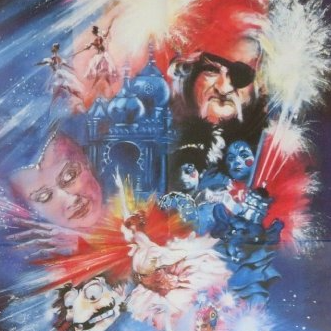Follow Me
What's the point of being inconspicuous if no one can see you doing it?

UK poster | Universal Pictures /
Cinema International Corporation
1971 — UK / USA
A UNIVERSAL picture
Cast: MIA FARROW, TOPOL and MICHAEL JAYSTON, with MARGARET RAWLINS, ANNETTE CROSBY, DUDLEY FOSTER, MICHAEL ALDRIDGE, MICHAEL BARRINGTON and NEIL McCARTHY
Director: CAROL REED
Producer: HAL WALLIS
Screenplay and Original work by: PETER SHAFFER
Editor: ANNE COATES
Cinematography: CHRISTOPHER CHALLIS
Production design: TERRY MARSH
Art direction: ROBERT CARTWRIGHT
Costumes: JULIE HARRIS
Music: JOHN BARRY
© Universal Pictures
So I can't find the original trailer, though Network seem to have cut this one for their home video release. It's… eh.
While strait laced chartered accountant Charles Sidley (Michael Jayston) helps his clientele to commit what resembles but is legally distinct from tax fraud, his wife, Belinda (Mia Farrow), disappears for vast hours at a time, frequently missing all manner of social engagements, like dinner parties and trips to the opera, that kind of crap, often wheeling in just late enough for everyone to have noticed her absence. Time was that this stick-in-the-mud was instantly smitten with a flighty, bohemian American ex-pat whose money ran out while travelling, and the two embarked on a whirlwind romance as they shared all their various loves, particularly of the arts. Then he went and married her, throwing her in the deep end with his muy elitist social circle (seriously, it’s suggested he hadn’t even introduced her until after the wedding). She drifts and becomes distant, leading to the current predicament. Her excuses have a bizarre air to them, and he jumps to the idea that she’s having an affair, as you do. To this end, he hires a private detective to find out… then the hard-nosed P.I. (Neil McCarthy) assigned to his case falls down an elevator shaft and instead he gets the eccentric Julian Cristoforou (Topol), the world’s most conspicuous man.
Follow Me, which may or may not include an exclamation mark in its title, depending on whether you trust the marketing or the film itself (the former says yes, the latter does not), is the final film directed by the highly respected Carol Reed, best known for films like Odd Man Out (1947) and The Third Man (1949). His career flagged a bit after that, although he had some stuff you’ve almost certainly heard of, such as Our Man in Havana (1960) and, rather out of keeping with those aforementioned films, Oliver! (1968). Screenonline suggests that that film’s critical and commercial success seems like it should have put him back on top, but it didn’t it and then he died. They’re a bit less glib about it than that, although they are very dismissive of this film in their article, as well as of his penultimate film, Flap (1970). I can’t really comment on that one (descriptions certainly make it sound… problematic though), but I feel there’s enough going on in Follow Me to be of some merit.
Relying pretty much entirely on three characters, like a two hander… with three people… if only ‘three hander’ was a term… I digress, relying on the three characters of the husband, the wife and the detective, this began life as a one act play about a decade earlier under the name ‘The Public Eye’† which was paired with another single act three character joint called The Private Ear. It apparently starred Maggie Smith and Kenneth Williams, so that’s odd to think about.‡ This appears to have been set entirely within Charles’ office; one assumes that the film thus has quite a bit of new or heavily revised content, given as a large quantity of its scenes don’t take place there and honestly wouldn’t make a whole lot of sense if they did, at least as they play out here. With that said, there is nonetheless a rather stagey feeling to the film’s structure, with the bulk of it consisting of two people in a room talking; even when it gets all three of the major players into a room together, it tends only to lean on only having two engaged in the conversation. The film has a definite act structure, the traditional three rather than the one, but there are very noticeable breaks in the action (such as it is) where something changes. The second act, I suppose, is where the film breaks furthest from stage conventions, largely due to an exorbitant amount of location shooting. I mean, really, given the subject matter, it feels like kind of a must to have it.
The burial of this film seems kind of weird given its pedigree. Then again, I’m not sure Carol Reed’s ever really a massive reappraisal in the vein of Michael Powell, a contemporary whose career also saw a massive downturn, much less the same consistent reputation of someone like David Lean. This all despite being behind some of the most lauded films in British cinema. One ponders as to why. Perhaps he had a lack of signature flair? The aforementioned Screenonline article declares him only as good as his collaborators. What makes a Carol Reed film? It certainly seems difficult to draw a line from The Third Man to A Kid for Two Farthings (1955), and then from that Follow Me, much less a direct one.
Is this a problem? Well, honestly, in the scheme of things, no, not really. I suppose the style at hand is an odd one however. Reed’s style seems a bit staid compared to similar films of the era mostly made by younger directors. The subject matter feels like it’d be a shoe-in for something more anarchic than the really rather gentle ride that the film takes us on. Part of this, one imagines, is as a result of being an adaptation of a stage play. At the same time, it gives the film an unusual feeling. It seems like it’d be very easy for this sort of story, as presented by a veteran director, to take a disapproving tone towards the bohemian elements, kids today argle bargle, and yet it doesn’t. While it’s willing to understand the husband’s concerns, its sympathies lie far more with the wife. She’s not attending to his needs properly, but this is ultimately because he’s not attending to her needs properly, but instead, perhaps unconsciously, trying to subsume her. Frankly it’s actually surprising to see a film of this vintage actually both call him out on it and have him recognise that that’s what he’s been doing.
The overall aesthetic of the film is… a bit generic? I mean, it’s all thoroughly competent and there’s some nice footage of late ‘60s / early ‘70s London and landmarks and that, but there’s not much that really pushes the envelope stylistically. The most you get is while Charles is expositing to Julian at the start, when discussing what other people have said on the matter to him, a bubble appears in between them that shows the person in question saying their piece. It has a certain charm, but it’s nothing one wouldn’t have seen before at this point in time.
I suppose the phrase ‘it has a certain charm’ can be applied to the film in general. I feel Topol probably has a lot to do with this, as he brings a lot of energy and an offbeat charisma to the role while still feeling grounded in reality. However, most of the film does come together; the script is gently witty, the performances are solid, the cinematography is decently attractive. The way the tone seems to lean into the ‘reality’ of the situation gives the whole thing a fairly distinct feel that makes it, while not some lost masterpiece, a worthwhile experience.
† The reason for the name change here was, one assumes, to avoid confusion with the then ongoing TV series Public Eye (1965-1975), originally made by Associated British and later by Thames. This didn't matter in the US, where it was released under the play's title, though the Canadian release apparently also used the 'Follow Me' title, possibly to avoid confusion with a different 'Public Eye' (it was seemingly a popular title for a bit in the '60s).
‡ In case you were wondering, Williams was the detective rather than the husband, who was played by Richard Pearson according to pictures apparently from the original programme floating around the internet. Smith meanwhile is the only one to appear in both plays.
At time of writing, Follow Me does not appear to be available to rent off of any major services, though it does have a page on Amazon, albeit under the US title. It also doesn't appear to have a page on JustWatch, so that's no good either. Alternatively, physical copies are reportedly available for rent via Cinema Paradiso.
The film presently has a 12 rating (last rated 2019), the BBFC citing “gory images, moderate sex references, language, [and] sexual violence references”. In case you were wondering how 'gory images' fits into this, Farrow's character goes to the cinema to watch Hammer films and there are some clips shown. It was originally rated A in the '70s.



